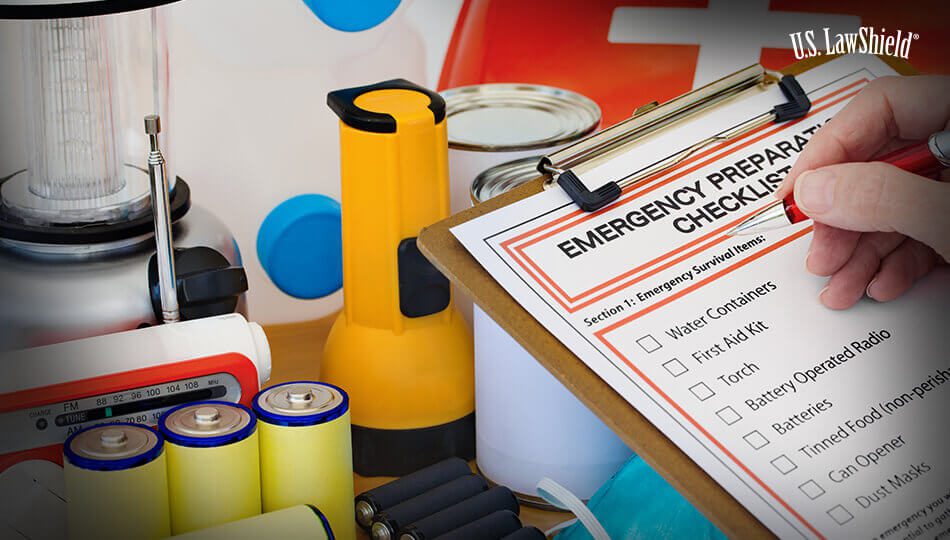
We see natural disasters on the news all the time, but do you have a clear plan of action if one happened in your city or town? A serious weather event is enough to deal with when it happens. When the minutes and seconds can make the difference between a threat to your life or safety, you want a preparedness plan in place so you can act quickly, have the things you need ready to go, and arrive at safety faster.
What Is National Preparedness Month?
National Preparedness Month is an observance each September to highlight the importance of citizen preparedness for potential disasters, emergencies, and service interruptions. Although low, the risk of an emergency is never zero, and even minor steps to prepare can make a huge difference in the moment.
Many people prefer to ignore the subject of disaster preparedness because it can generate anxiety about things outside their control. If someone you include in your emergency plan becomes anxious, highlight that preparing for a disaster doesn’t make it more likely to happen. In fact, a little bit of thought, planning, and expenditure now can save lives in the future. It’s a difficult subject to broach, but it’s too important to leave to chance.
If your community does encounter a Hurricane Katrina-level disaster, you want to be ready with a necessary plan and resources. Start by using these four key steps from Ready.gov to create a preparedness plan for your household. Remember, if you can plan a birthday party, you can plan for a personal, local, or national emergency.
Enjoying this content? Find out how you can get more sent straight to your inbox.
National or Local? Weather or Unrest? A Disaster Can Take Many Forms
Wherever you live, a natural emergency can strike at any time. From the tsunamis and earthquakes of the West Coast, to the fires, tornadoes, and winter storms of the Midwest, to hurricanes and floods in the eastern U.S., all Americans are at risk of a natural disaster.
Each potential problem requires unique preparations, by both you and your local emergency services. Because of this, it’s important to have the right data and resources to ensure your personal or community emergency preparedness plan addresses the most likely scenarios.
While weather can certainly be disastrous, it’s not the only event that requires preparedness. Civil unrest has become more prominent over the last few years. Being aware of the civil activity in your community and having a plan and resources to “bug-out” (flee) or “bug-in” (fortify your home) can put you ahead when dealing with these issues—or help you avoid them entirely.
Having a plan for extended interruption of local health or utility services is a good idea too. Alternate electricity sources, proper water and food storage, and stocking up on and taking classes on how to use medical equipment can all be potential lifesavers.
Talking to your doctor about preparing for emergency events and your specific medical needs can also be a helpful step, particularly if you’re currently taking any prescriptions. Consider that certain medications such as insulin require refrigeration. If you suffer from diabetes, a generator and a hefty stockpile can mean the difference between being uncomfortable or requiring emergency medical services that may not be readily available.
These are often expensive measures that not everyone can take, but a community effort might address a similar need for many in your area.
Information Is Your Best Defense: FEMA.gov and Other Emergency Resources
This month is a great time to discuss emergency preparedness with your family and friends and take steps to prepare your household, from setting up emergency alerts to building an emergency kit.
You can also bring up the issue with your local government. You can present the Ready.gov resources to your city manager or council and ask what steps they have taken on this front and what you can do to be ready for a potential disaster in your area. You could survey your government representatives, neighbors, or employer and see what gaps in emergency preparedness might be addressed. You may be taken much more seriously if you bring relevant information and suggestions for how to implement a plan to ensure the health and safety of yourself and your community.
Family preparedness starts with you but doesn’t have to stop there!
Your Protection Starts Here!
The information provided herein is solely an overview intended to provide general information and should not be considered legal advice. All rights to this work are reserved. No part of this work may be reproduced or copied in any form or by any means without prior written consent. U.S. LawShield® is a Legal Defense for Self Defense® Program, not a law firm. Membership in the U.S. LawShield Legal Defense for Self Defense Program is not a guarantee of any particular outcome. All legal services are provided by independent third-party program attorneys who are part of the Program. Visit uslawshield.com for terms, conditions, restrictions, and insurance licensing information.





Leave A Comment